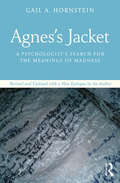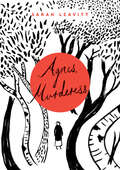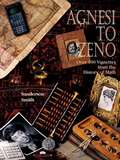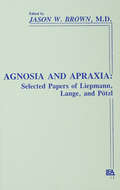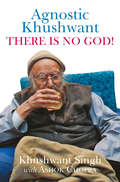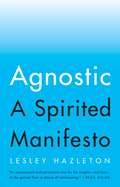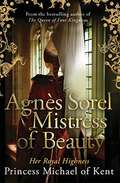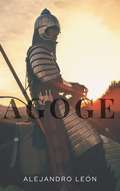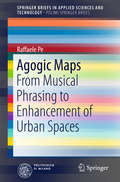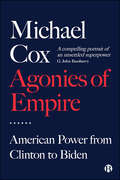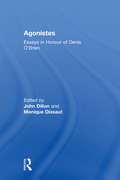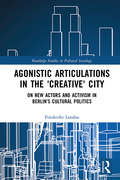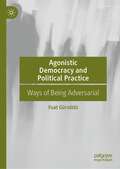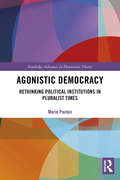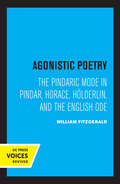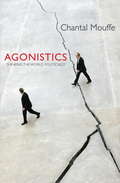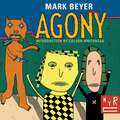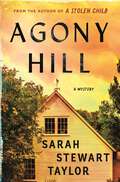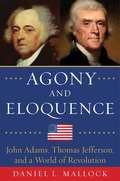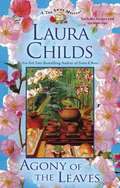- Table View
- List View
Agnes the Sheep
by William TaylorAn eccentric old lady leaves her large and nasty sheep, Agnes, to Belinda and Joe, setting off a wild and woolly sheep chase. [from the back cover] "Agnes is a real woolly bully. Joe and Belinda made a promise to old Mrs. Carpenter. They promised to take care of Agnes--no matter what. But Agnes isn't your ordinary, everyday sheep. She's Agnes--the attack sheep. So when Agnes wants her bread and milk, she gets it. And when Agnes feels like chasing a neighbor around the yard and butting him over the fence, no one can stop her. But there are people who want to stop her. And even though Joe and Belinda realize that Agnes isn't the nicest sheep in the world, they don't understand why anyone would want to turn her into a sweater and a few lamb chops. So they decide to save Agnes. And to prove that you can teach an old sheep new tricks. Sometimes." Look for Knitwits, another humorous book by William Taylor you will enjoy from the Bookshare collection.
Agnes's Jacket: A Psychologist's Search for the Meanings of Madness.Revised and Updated with a New Epilogue by the Author
by Gail A. HornsteinIn a Victorian-era German asylum, seamstress Agnes Richter painstakingly stitched a mysterious autobiographical text into every inch of the jacket she created from her institutional uniform. Despite every attempt to silence them, hundreds of other psychiatric patients have managed to get their stories out, or to publish them on their own. Today, in a vibrant network of peer-advocacy groups all over the world, those with firsthand experience of emotional distress are working together to unravel the mysteries of madness and to help one another recover. Agnes’s Jacket tells their story, focusing especially on the Hearing Voices Network (HVN), an international collaboration of professionals, people with lived experience, and their families and friends who have been working to develop an alternative approach to coping with voices, visions, and other extreme states that is empowering and useful and does not start from the assumption that such people have a chronic illness. A vast gulf exists between the way medicine explains psychiatric conditions and the experiences of those who suffer. Hornstein’s work helps us to bridge that gulf, guiding us through the inner lives of those diagnosed with schizophrenia, bipolar illness, depression, and paranoia, and emerging with nothing less than a new model for understanding one another and ourselves.
Agnes, Murderess
by Sarah LeavittAgnes, Murderess is a graphic novel inspired by the bloody legend of Agnes McVee, a roadhouse owner, madam and serial killer in the Cariboo region of British Columbia in the late nineteenth century. Fascinated by this legend—which originated in a 1970s guide to buried treasure in BC, and has never been verified—Sarah Leavitt has imagined an entirely new story for the mysterious Agnes: her immigration to Canada from an isolated Scottish Island; her complex entanglement with shiny things; and her terrifying grandmother, Gormul, who haunts Agnes's dreams and waking life.Leavitt puts a decidedly queer twist on the story, moving from women's passionate friendships in the gardens of St John's Wood to female relationships in the Canadian wild. At the same time, the book grapples with the dangerous pre-conceived notions held by settlers that the country was a "new world," free of ghosts and history. Agnes, Murderess presents a tortured, complicated woman struggling to escape her past. It is a spine-chilling tale of ghosts and murder, friendship and betrayal, love and greed, fate and choice.
Agnesi to Zeno: Over 100 Vignettes From the History of Math
by Sanderson SmithAgnesi to Zeno: Over 100 Vignettes from the History of Math presents a series of vignettes that highlight developments in mathematical thought and achievement as they relate to human history. For the most part, the vignettes are chronologically arranged; topics that span long periods of time are placed strategically throughout the book.
Agnikundma ugelu gulab Biography of late shri Mahadev Haribhai Desai: અગ્નિકુંડમાં ઊગેલું ગુલાબ
by નારાયણ દેસાઈ1500 પાનામાં વિસ્તરેલું આ ચરિત્ર જેટલું પ્રાસાદિકક છે તેટલું જ તટસ્થ રીતે લખાયેલું છે . પિતાના ચરિત્ર લેખે એ જવું અધિકૃત(ઑ્થન્ટક) છે એવું જ મહાદેવ - ચરિત્ર લખે એ સર્વગ્રાહી છે. મહાદેવભાઈના સાક્ષાત્ પરિચય ઉપરાત બીજા ઘણા ચરિત્ર-સંદર્ભગ્રાંથોમાથી નારાયણભાઈ પસાર થયા છે. (એમણે લખ્યું છે : `મહાદેવભાઈની ડાયરી કહેવાય મહાદેવભાઈની, પણ એમાં રજમાત્ર જીવનવિગત મહાદેવભાઈની ન જડે ! એટલે મારે મહાદેવભાઈ બીજે જ ખોળવા પિયા!') લાંબા પટમાં લખાયેલું હોવા છતાં ન થકવનારું આ પુસ્તક હાથમાથી મૂકવાનું મન નહીં થાય... \
Agnosia and Apraxia: Selected Papers of Liepmann, Lange, and Potzl (Institute for Research in Behavioral Neuroscience Series)
by Ellen Perecman Jason W. Brown George Dean Emil Franzen Joachim LuwischFirst Published in 1988. The reader is invited to explore this collection of early German papers and not to analyze the work through a comparison with the present but to approach it with a relaxation of bias that extends a new hearing to old ideas. The reader may be surprised to see how little has changed in the association or callosal theory of apraxia since this review by Liepmann. Of interest is the care with which Liepmann studied his patients and the ingenious anatomical accounts.
Agnostic Khushwant: There Is No God
by Khushwant Singh Ashok ChopraInstead of entering into a pointless debate on whether or not God exists, it is more important to bear in mind that belief in the existence of God has little bearing on making a person a good or a bad citizen. One can be a saintly person without believing in God and a detestable villain believing in Him. In my personalized religion, there is NO GOD! Khushwant Singh, over the decades, has built up a reputation for coming up with something new and controversial in each book, and he does not disappoint his readers this time too. He begins with a chapter on the ‘need for a new religion – without God’, in which he questions the relevance of God. He then moves on to describe how religion has proved to be more harmful than beneficial and, in the process, debunks astrologers and the breed of so-called ‘godmen’. However, he is not dismissive of religion. Through his lucid writing, he brings out the beauty and significance of holy books such as the Bhagvad Gita, the Quran and the Granth Sahib. He provides relevant extracts to highlight the poetry and the music in such books. The author next tries to dispel the prejudices held by many non-Muslims against their Muslim compatriots by giving down-to-earth examples. He also emphasizes the importance of the Ramzaan fast. Khushwant Singh’s description of the life and times of Guru Nanak and Guru Gobind Singh and his in-depth analysis of the Granth Sahib throw new light on a particularly troubled period in India’s history. The chapter devoted to the interaction of the author (a confirmed agnostic) with the Dalai Lama (probably the world’s most renowned spiritual leader) makes for fascinating reading. Here’s one book containing a wealth of knowledge and information that you would want to read or consult again and again.
Agnostic: A Spirited Manifesto
by Lesley HazletonA widely admired writer on religion celebrates agnosticism as the most vibrant, engaging--and ultimately the most honest--stance toward the mysteries of existence. One in four Americans reject any affiliation with organized religion, and nearly half of those under thirty describe themselves as "spiritual but not religious." But as the airwaves resound with the haranguing of preachers and pundits, who speaks for the millions who find no joy in whittling the wonder of existence to a simple yes/no choice? Lesley Hazleton does. In this provocative, brilliant book, she gives voice to the case for agnosticism, breaks it free of its stereotypes as watered-down atheism or amorphous "seeking," and celebrates it as a reasoned, revealing, and sustaining stance toward life. Stepping over the lines imposed by rigid conviction, she draws on philosophy, theology, psychology, science, and more to explore, with curiosity and passion, the vital role of mystery in a deceptively information-rich world; to ask what we mean by the search for meaning; to invoke the humbling yet elating perspective of infinity; to challenge received ideas about death; and to reconsider what "the soul" might be. Inspired and inspiring, Agnostic recasts the question of belief not as a problem to be solved but as an invitation to an ongoing, open-ended adventure of the mind.From the Hardcover edition.
Agnès Sorel: Mistress of Beauty
by HRH Michael of KentFrom HRH Princess Michael of Kent, bestselling author of The Queen of Four Kingdoms, comes the extraordinary second volume in the Anjou trilogy.Yolande, the Queen of Four Kingdoms is dead. Agnès Sorel, beautiful, innocent, twenty years old, had arrived a year earlier with the court of Yolande's son, René D'Anjou, and remained with his mother at her request, knowing how much the King of France, her dissolute son-in-law Charles VII, would need wise guidance. As a trusted confidant of Yolande, Agnès captivates everyone she meets, and in her role as a demoiselle to René's wife, Isabelle of Lorraine, Agnès finds herself firmly ensconced in the royal court. Soon though, whispers at court regarding Charles's burgeoning feelings for her begin to grow, and despite her best efforts to resist, Agnès is alarmed to discover that she too is in love.Plagued by guilt but unable to deny her feelings for the King, Agnès is forced to choose between her love for Charles, and her duty to herself . . . Praise for The Queen of Four Kingdoms: 'Meticulously researched and powerfully evoked.' Philippa Gregory 'Takes the reader to the heart of this glamorous, dangerous world, and holds them spellbound. I loved it.' Julian Fellowes 'Riveting . . . spellbinding.' Mail on Sunday'A page-turning blend of epic battles, betrayal, seduction and heroism.' Hello
Agnès Sorel: Mistress of Beauty
by HRH Princess of KentFrom HRH Princess Michael of Kent, bestselling author of The Queen of Four Kingdoms, comes the extraordinary second volume in the Anjou trilogy.Yolande, the Queen of Four Kingdoms is dead. Agnès Sorel, beautiful, innocent, twenty years old, had arrived a year earlier with the court of Yolande's son, René D'Anjou, and remained with his mother at her request, knowing how much the King of France, her dissolute son-in-law Charles VII, would need wise guidance. As a trusted confidant of Yolande, Agnès captivates everyone she meets, and in her role as a demoiselle to René's wife, Isabelle of Lorraine, Agnès finds herself firmly ensconced in the royal court. Soon though, whispers at court regarding Charles's burgeoning feelings for her begin to grow, and despite her best efforts to resist, Agnès is alarmed to discover that she too is in love.Plagued by guilt but unable to deny her feelings for the King, Agnès is forced to choose between her love for Charles, and her duty to herself . . . Praise for The Queen of Four Kingdoms: 'Meticulously researched and powerfully evoked.' Philippa Gregory 'Takes the reader to the heart of this glamorous, dangerous world, and holds them spellbound. I loved it.' Julian Fellowes 'Riveting . . . spellbinding.' Mail on Sunday'A page-turning blend of epic battles, betrayal, seduction and heroism.' Hello
Agoge: Rise of a Renegade
by Alejandro LeónIn ancient Greece, the Spartans, who belonged to the city-state Sparta, lived in a different way than the rest of the cities that formed the Greek State. Spartans were extreme: their moto was freedom or death, and they were willing to do anything, literally, anything to keep living free. Robin, a baby left on his luck in the middle of a forest from the very day he was born, was cruelly discarded by the Spartans because of a cataract in his right eye, is rescued and raised by one of the villagers from Helos, a neighbor city. His parents, not wanting to lie the child, on an early age tell him the truth about the way the found him in the forest. Then, little Robin, feeling deeply rejected, swore to himself not to rest until he was able to compensate his inborn defect of his cataract and become the very best warrior in Greece. With this idea on his mind, he puts all his energies into training to be stronger than all the Spartans. So, he created his very own custom training which, according to him, would be harder than the agoge, the spartan training. The years pass and Robin will find himself in many encounters with Spartans in many of his expeditions inside the forest. But soon, his services will be required for a different end: war. A Persian invasion is coming and Sparta summons all the nearby cities to a recruitment process to reinforce its army and avoid the fall of Laconia. Robin will then have the opportunity to show his fierceness and skills in the battle field, the opportunity he prepared his whole life for.
Agogic Maps: From Musical Phrasing to Enhancement of Urban Spaces (SpringerBriefs in Applied Sciences and Technology)
by Raffaele PeThis book explores the value of the musical concept of "agogics" - the modification of regular rhythm to enhance expressive potential - in understanding urban spatial configurations within the current technological context and in developing urban maps that exploit sonic signals to create an open learning framework. The book starts by discussing the meaning and significance of agogics in the musical and artistic realm, with reference to the work of Adolphe Appia, Emile-Jaques Dalcroze, and Iannis Xenakis, among others. Its relevance to cartography and mapping is then examined, taking into account the contributions of Ian McHarg, Bill Hillier, Mark Shepard, and Robin Minard. The nature and value of agogic maps, for example in fostering awareness of place and effective organization of spatial development, are described in detail, with reference to case studies in Dar es Salaam, Tanzania and Segrate, Italy. It is explained how agogic maps take advantage of innovative categories and scripting equipment to provide a new mapping instrument for spatial and urban configurations, highlighting the interdependence between aural signals and spatial variables. This book will be of interest to architects, urbanists, and musicians with a specific interest in space and sound design.
Agonies of Empire: American Power from Clinton to Biden
by Michael CoxThe defeat of Donald Trump in November 2020 followed by the attack on the US Congress on 6th January 2021 represented a tipping point moment in the history of the American republic. Divided at home and facing a world sceptical of American claims to be the ‘indispensable nation’ in world politics, it is clear that the next few years will be decisive ones for the United States. But how did the US, which was riding high only 30 years ago, arrive at this critical point? And will it lead to the fall of what many would claim has been one of the most successful empires of modern times? In this volume, Michael Cox, a leading scholar of American foreign policy, outlines the ways in which five very different American Presidents – Clinton, Bush, Obama, Trump and now Biden – have addressed the complex legacies left them by their predecessors while dealing with the longer-term problems of running an empire under increasing stress. In so doing, he sets out a framework for thinking critically about US foreign policy since the end of the Cold War without ever losing sight of the biggest question of all: can America continue to shape world affairs or is it now facing long-term decline?
Agonistes: Essays in Honour of Denis O'Brien
by Monique DixsautAgonistes comprises a collection of essays presented by his friends and colleagues to Denis O'Brien, former Directeur de recherché at the Centre Nationale de Recherché Scientifique, representing the full range of his scholarly interests in the field of ancient philosophy, from the Presocratics, through Plato, Aristotle and Hellenistic philosophy, to Plotinus and later Neoplatonism. The honorand himself leads off with a stimulating Apologia, sketching the development of his scholarly interests and dwelling on the issues that have chiefly concerned him. The contributions then follow in chronological order, under four headings: I From the Presocratics to Plato (Frère, Brancacci); II From Plato to the Stoics (Brisson, Casertano, Dixsaut, Kühn, McCabe, Narcy, Rowe, Goulet); III Plotinus and the Neoplatonist Tradition (O'Meara, Sakonji, Gersh, Steel, Dillon, Smith); IV Saint Augustine and After (Pépin, Rist, Brague/Freudenthal). They comprise a significant representation of the most distinguished scholars both on the continent and in the British Isles, and fairly represent the wide influence which Denis O'Brien has had on his contemporaries. The volume includes also a full bibliography of O'Brien's works.
Agonistic Articulations in the 'Creative' City: On New Actors and Activism in Berlin’s Cultural Politics (Routledge Studies in Political Sociology)
by Friederike LandauThis book offers an empirically-grounded account of the emergence and political activities of a new collective actor in Berlin’s art field. Investigating the organizational and representative practices of Koalition der Freien Szene (Coalition of the Independent Scene) – a trans-disciplinary action platform assembling a wide variety of cultural producers in Berlin – the author unpacks the political organization of one of the most compelling contemporary art scenes, or ‘creative’ cities, worldwide, analysing both its concrete policy ‘success’ and the means by which it seeks to challenge and rearticulate the meaning of Berlin as a ‘creative’ city from the producers’ point of view. The book thus opens new opportunities for long-term transformations of the cultural political field. Theoretically sophisticated and based on empirical material including interviews with spokespeople and cultural administrators, Agonistic Articulations in the ‘Creative’ City presents a unique conceptualization of new modes of political collectivization, representation and legitimacy that imagine new avenues of political engagement at a time when political institutions, parties and regimes of representation are in crisis. As such, it will appeal to scholars of sociology, political science and urban studies with interests in social movements and cultural activism.
Agonistic Democracy
by Mark WenmanThis pioneering book delivers a systematic account of agonistic democracy, and a much-needed analysis of the core components of agonism: pluralism, tragedy, and the value of conflict. It also traces the history of these ideas, identifying the connections with republicanism and with Greek antiquity. Mark Wenman presents a critical appraisal of the leading contemporary proponents of agonism and, in a series of well-crafted and comprehensive discussions, brings these thinkers into debate with one another, as well as with the post-structuralist and continental theorists who influence them. Wenman draws extensively on Hannah Arendt, and stresses the creative power of human action as augmentation and revolution. He also reworks Arendt's discussion of reflective judgement to present an alternative style of agonism, one where the democratic contest is linked to the emergence of a militant form of cosmopolitanism, and to prospects for historical change in the context of neoliberal globalisation.
Agonistic Democracy and Political Practice: Ways of Being Adversarial
by Fuat GürsözlüThis book explores the implications of agonistic democratic theory for political practice. Fuat Gürsözlü argues that at a time when political parties exacerbate political division, political protesters are characterized as looters and terrorists, and extreme partisanship and authoritarian tendencies are on the rise, the agonistic approach offers a much-needed rethinking of political practice to critically understand challenges to democracy and envision more democratic, inclusive, and peaceful alternatives. Inspired by Chantal Mouffe’s agonistic theory and drawing on insights of other prominent agonistic scholars, Gürsözlü offers a distinctive approach that develops the connections between the agonistic approach and political practice. His main claim is that approaching democratic politics from an agonistic perspective changes the way we understand the nature of democratic society, the place of political protest in democracy, the nature of adversarial engagement, and the democratic function of political parties. The book also advances an account of agonistic peace that is best fitted to the pluralistic and inherently conflictual nature of democratic societies. This book should be of interest to anyone working in the field of contemporary political theory, political philosophy, peace studies, and philosophy of peace.
Agonistic Democracy: Rethinking Political Institutions in Pluralist Times (Routledge Advances in Democratic Theory)
by Marie PaxtonAgonistic Democracy explores how theoretical concepts from agonistic democracy can inform institutional design in order to mediate conflict in multicultural, pluralist societies. Drawing on the work of Foucault, Nietzsche, Schmitt, and Arendt, Marie Paxton outlines the importance of their themes of public contestation, contingency and necessary interdependency for contemporary agonistic thinkers. Paxton delineates three distinct approaches to agonistic democracy: David Owen’s perfectionist agonism, Mouffe’s adversarial agonism, and William Connolly and James Tully’s inclusive agonism. Paxton demonstrates how each is fundamental to enabling citizens to cultivate better virtues for themselves and society (Owen), motivating democratic engagement (Mouffe) and enhancing relations of respect and understanding between conflicting citizens (Connolly and Tully). Situated within the context of a deeply polarised post-Trump America and post-Brexit Britain, this book reveals the need to rethink our approach to conflict mediation through democratic institutions. Pulling together insights from experimental research with deliberative democratic innovations, Paxton explores how agonistic theory might be institutionalised further. Through discussing ways in which agonistic institutions might be developed to render democracy more virtuous, more engaging, and more inclusive, Agonistic Democracy provides a unique resource for students of contemporary political theory.
Agonistic Memory and the Legacy of 20th Century Wars in Europe (Palgrave Macmillan Memory Studies)
by Stefan Berger Wulf KansteinerThis book discusses the merits of the theory of agonistic memory in relation to the memory of war. After explaining the theory in detail it provides two case studies, one on war museums in contemporary Europe and one on mass graves exhumations, which both focus on analyzing to what extent these memory sites produce different regimes of memory. Furthermore, the book provides insights into the making of an agonistic exhibition at the Ruhr Museum in Essen, Germany. It also analyses audience reaction to a theatre play scripted and performed by the Spanish theatre company Micomicion that was supposed to put agonism on stage. There is also an analysis of a Massive Open Online Course (MOOC) designed and delivered on the theory of agonistic memory and its impact on the memory of war. Finally, the book provides a personal review of the history, problems and accomplishments of the theory of agonistic memory by the two editors of the volume.
Agonistic Poetry: The Pindaric Mode in Pindar, Horace, Hölderlin, and the English Ode
by William FitzgeraldThis title is part of UC Press’s Voices Revived program, which commemorates University of California Press’s mission to seek out and cultivate the brightest minds and give them voice, reach, and impact. Drawing on a backlist dating to 1893, Voices Revived makes high-quality, peer-reviewed scholarship accessible once again using print-on-demand technology. This title was originally published in 1993.
Agonistics
by Chantal MouffePolitical conflict in our society is inevitable, and its results are often far from negative. How then should we deal with the intractable differences arising from complex modern culture? Developing her groundbreaking political philosophy of agonistics - the search for a radical and plural democracy - Chantal Mouffe examines international relations, strategies for radical politics, the future of Europe and the politics of artistic practices. She shows that in many circumstances where no alternatives seem possible, agonistics offers a new road map for change. Engaging with cosmopolitanism, post-operaism, and theories of multiple modernities she argues in favour of a multipolar world with real cultural and political pluralism.From the Trade Paperback edition.
Agony
by Mark BeyerENJOY THE ECSTASY OF AGONY. Amy and Jordan are just like us: hoping for the best, even when things go from bad to worse. They are menaced by bears, beheaded by ghosts, and hunted by the cops, but still they struggle on, bickering and reconciling, scraping together the rent and trying to find a decent movie. It&’s the perfect solace for anxious modern minds, courtesy of one of the great innovators of American comics. Now if only Amy&’s skin would grow back ...This NYRC edition features a recreation of the original, pocket-size, slipcovered, paperback, designed by Art Spiegelman and Francoise Mouly.
Agony Hill: A Mystery (A Bethany, Vermont Mystery #1)
by Sarah Stewart TaylorSet in rural Vermont in the volatile 1960s, Agony Hill is the first novel in a new historical series full of vivid New England atmosphere and the deeply drawn characters that are Sarah Stewart Taylor's trademark.In the hot summer of 1965, Bostonian Franklin Warren arrives in Bethany, Vermont, to take a position as a detective with the state police. Warren's new home is on the verge of monumental change; the interstates under construction will bring new people, new opportunities, and new problems to Vermont, and the Cold War and protests against the war in Vietnam have finally reached the dirt roads and rolling pastures of Bethany. Warren has barely unpacked when he's called up to a remote farm on Agony Hill. Former New Yorker and Back-to-the-Lander Hugh Weber seems to have set fire to his barn and himself, with the door barred from the inside, but things aren’t adding up for Warren. The people of Bethany—from Weber’s enigmatic wife to Warren's neighbor, widow and amateur detective Alice Bellows — clearly have secrets they’d like to keep, but Warren can’t tell if the truth about Weber’s death is one of them. As he gets to know his new home and grapples with the tragedy that brought him there, Warren is drawn to the people and traditions of small town Vermont, even as he finds darkness amidst the beauty.
Agony and Eloquence: John Adams, Thomas Jefferson, and a World of Revolution
by Daniel Mallock<P>The drama of John Adams and Thomas Jefferson is the foundational story of America--courage, loyalty, hope, fanaticism, greatness, failure, forgiveness, love. <P> Agony and Eloquence is the story of the greatest friendship in American history and the revolutionary times in which it was made, ruined, and finally renewed. <P> In the wake of Washington’s retirement, longtime friends Thomas Jefferson and John Adams came to represent the opposing political forces struggling to shape America’s future. Adams’s victory in the presidential election of 1796 brought Jefferson into his administration--but as an unlikely and deeply conflicted vice president. <P>The bloody Republican revolution in France finally brought their political differences to a bitter pitch. In Mallock’s take on this fascinating period, French foreign policy and revolutionary developments--from the fall of the Bastille to the fall of the Jacobins and the rise of Napoleon--form a disturbing and illuminating counterpoint to events, controversies, individuals, and relationships in Philadelphia and Washington. <P>Many important and fascinating people appear in the book, including Thomas Paine, Camille Desmoulins, Dr. Benjamin Rush, Tobias Lear, Talleyrand, Robespierre, Danton, Saint-Just, Abigail Adams, Lafayette, James Madison, John Quincy Adams, Dr. Joseph Priestley, Samuel Adams, Philip Mazzei, John Marshall, Alexander Hamilton, and Edward Coles. They are brought to life by Mallock’s insightful analysis and clear and lively writing. <P>Agony and Eloquence is a thoroughly researched and tautly written modern history. When the most important thing is at stake, almost anything can be justified. <P><b>A New York Times Bestseller</b>
Agony of the Leaves
by Laura ChildsIn the latest novel from the New York Times bestselling author of Scones and Bones, Indigo Tea Shop owner Theodosia Browning finds herself in hot water when a body surfaces at the grand opening of Charleston's Neptune Aquarium... The opening of the aquarium is a major Charleston event, and Theodosia has been hired to cater tea, scones, and sandwiches for the private party to honor dignitaries and big buck donors. Things are going swimmingly, until Theodosia escapes the party for a momentary rest, only to discover the body of a man entangled in a net, drowned in one of the aquarium's state-of-the-art tanks.To make matters worse, the victim is Theodosia's former boyfriend Parker Scully. The EMTs on the scene think Parker's drowning was an accident, but when Theodosia notices what look like defense wounds on his hands, she realizes that someone wanted Parker dead. The local police aren't keen on hearing her theory-especially because of her ties to the victim-so Theodosia knows that if she wants Parker's killer brought to justice, she'll have to jump into the deep end and start her own investigation...INCLUDES DELICIOUS RECIPES AND TEA TIME TIPS!

